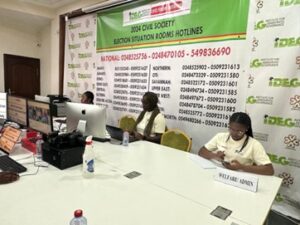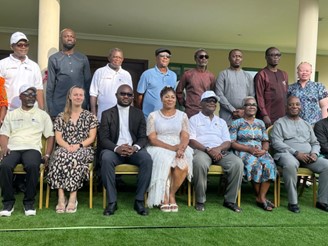By Ernest Bako WUBONTO
The Institute for Democratic Governance (IDEG) in collaboration with the Civic Forum Initiative (CFI) has officially reopened its national ‘Election Situation Room’ (ESR) for monitoring electoral incidents in the 2024 general elections.
The ESR, is expected to serve as the central point for real-time data collection, monitoring electoral incidents, and ensuring swift interventions through collaboration with key partners such as the Electoral Commission, the Ghana Police Service, the National Elections Security Task Force, media, and other local and international observer groups.
The 2024 ESR will also act as a vital platform for disseminating information and expert analysis to Election Management Bodies (EMBs), security agencies, and the public, by doing so, it aims to enhance transparency and credibility in reporting electoral processes and outcomes.
The initiative introduced in 2008, also aims to control the uncoordinated proliferation of civil society monitoring and reporting activities across the country during general elections.
Executive Director of IDEG, Dr Emmanuel Akwetey, speaking at the media launch event, highlighted that the situation room concept was born out of the fear of violence ahead of the 2008 general election, which was deployed to play a critical role instrumental to the nation’s peace.

He said in 2012, it helped to address what would have led to a violent situation when one of the parties urged its members to wear white and start jubilating because victory was already at hand when the EC hadn’t declared any results yet. Subsequently, the ESR has always played a vital role in data gathering and analysis, addressing misinformation and identifying electoral violence for swift response from the security task force.
“Election observation and monitoring have become an integral part of the electoral process in many democracies. Civil society organisations have played varying roles in the electioneering process through activities such as civic and voter education, and observation of voting among others.
“In recent times these interventions have been expanded to include coordinated observation of polling stations on election day, collaboration with electoral management bodies (EMBs) to maintain the credibility of elections, information sharing and punditry on electoral issues for media organisations, engagements and coordination with security services to ensure peace and security before, during and after elections,” he explained.
However, the proliferation of uncoordinated CSO activities presents diverse challenges to both the integrity and acceptability of electoral outcomes and the general peace and stability of the country; hence the need to coordinate these activities through the ESR.
Public Relations Officer, TUC and Member, CFI, Naa Ayele Ardayfio-Sekyere, reiterated that since its inception in 2008, the IDEG-CFI Election Situation Room (ESR) has to the best of its ability, played a crucial role in coordinating field observers and monitoring the political landscape during elections.
“The ESR serves as a command center for receiving real-time reports from observers deployed across the country, enabling us to respond swiftly to any threats that may jeopardize the integrity of our electoral process. As we go to the polls, our mission is more critical than ever for our presidential and parliamentary elections under the Fourth Republic,” she emphasised.
The Head of Advocacy and Institutional Relations, IDEG, Kwesi Jonah, touched on the implementation process, narrating that the ESR shall be operated for at least 12 hours per day and extended to 24 hours during the election period from voting day to the final declaration of results.
“Collect and collate information on election-related activities particularly incidences of violence from credible sources and report to the National ESR. Disseminate information on decisions made by the National Steering Committee of the CFI to members and the public,” he indicated.










